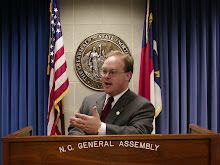Public Financing of Campaigns Preserves Power for the People
By Wayne Goodwin
July 2, 2007
So why do we elect so many statewide officials?
Back in the 1700s, fear of King-picked Royal Governors and their great powers helped sow strong sentiments against strong State executives. Those seeds sprouted into many revisions of our State constitution, guaranteeing a weak governor and a State government with decentralized executive authority.
As our state grew, responsibility for important policy areas such as agriculture, education, labor policy, and the regulation of insurance was divided among independently-elected constitutional offices, together called the Council of State.
Because of this division, each Council of State officer is continuously and increasingly bombarded by special interests who want to influence these policy areas. The bombardment reaches fever pitch leading up to elections, when special interests ratchet up their pitch with campaign contributions or promises of contributions to candidates they approach.
Witness recent scandals involving disgraced former Agriculture Commissioner Meg Scott Phipps, House Speaker Jim Black, and others during the last few years. What have these scandals done to public trust in government? It is vastly important for such officials to remain free from actual or perceived undue influence. That is why campaign reforms for these offices, and others, is so badly needed.
This is not merely academic for me: It is real. As an eight-year State Representative and a candidate for Labor Commissioner in 2004, I witnessed first-hand what our candidates for Statewide office endure. While it used to be that a candidate would visit all the county seats and the respective Sheriff in each courthouse, and call on a few people in each county while enjoying an RC Cola at a country store or humpteen BBQs, today campaigning is about the money chase and spending every waking hour raising campaign contributions. Why? Because campaigns today cost more and involve expensive TV ads, countless polls, and consultants in a world where fewer and fewer folks pay attention to elections. In my own 2004 race, like other candidates, I had to lock myself in a cubicle – a campaign War Room – and spend up to 12 hours daily, 6 days weekly, on the phone between 6 and 12 months. Frankly, asking people you know – and those you don't know - to each donate up to thousands of dollars is awkward … but a necessary component of the current system. Asking someone to donate to a charitable cause or a church or a scholarship program is one thing, but making 200 calls daily for your personal campaign's benefit decimates what a candidate should be doing: Spending time with voters.
To accumulate the amount of cash most campaigns are told they need these days, they choose to focus more often on donors of larger sums.
It should also be no surprise that many persons who donate to Council of State offices are often persons directly or indirectly regulated by those very offices, a situation which is potentially fraught with all sorts of problems. Big donors sometimes use their influence to seek tax breaks, weak regulations, or favors that cost the taxpayers millions of dollars.
In 2007 legislators have filed a bill that's a first step toward solving this problem. House Bill 1517 would create a voluntary public financing option for certain Council of State candidates. Lawmakers, current and former Council of State leaders, and thousands of North Carolinians believe it is a good idea because it gives candidates a chance to forego the dreadful money chase in exchange for limited public money to run their campaigns. In exchange for participating, candidates waive their right to seek contributions from big donors and from political action committees (PACs). If the General Assembly passes this pilot program, then in 2008 we will take a gigantic step towards cleaning up the campaign process. We will increase the number of qualified candidates willing to run and interaction between them and the voters.
North Carolina has a history that recognizes the value of a government based on power sharing and not powerful State executives. Public financing of campaigns is a voluntary method that helps ensure this power-sharing continues. Let's keep North Carolina elections voter-owned. We all win when the public knows our politicians are not beholden to powerful special interests, but only beholden to us. # # #
Wayne Goodwin is a Director and Secretary of the N.C. Center for Voter Education. A native of Hamlet, he represented Richmond, Scotland, Stanly, and Montgomery Counties in the N.C. House of Representatives for eight years. He was co-sponsor of the original judicial public financing legislation. Today he is the Assistant Commissioner of Insurance. His spouse, State Representative Melanie Wade Goodwin, chairs the House Election Laws and Campaign Finance Reform Committee.



